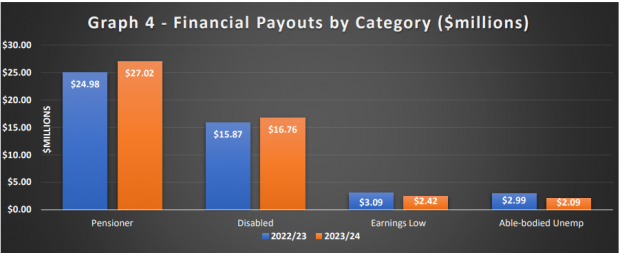
In the 2023-2024 fiscal year, total payments made to clients of the Financial Assistance and Child Day Care Allowance programs rose by 2% to .26 million, up from .10 million in the previous fiscal year, according to a report from the Department of Financial Assistance. Minister of Youth, Social Development and Seniors, Tinee Furbert, presented this annual report to the House of Assembly, in accordance with the provisions outlined in the Financial Assistance Act of 2001.
The report highlights a vital demographic breakdown of Financial Assistance recipients, showing that while total expenditures have increased, the number of clients utilizing these services has generally declined. The 2023-24 fiscal year recorded an average of 1,991 recipients of Financial Assistance, down from 2,095 the previous year. The major groups receiving assistance include 1,031 pensioners and seniors, 737 individuals with disabilities, 122 people with low earnings, and 101 abled-bodied unemployed persons. These figures reflect ongoing trends within the assistance program.
A notable feature of this year’s report is the substantial increase in the Child Day Care Allowance program, which averaged 264 children in 2023-2024—more than doubling the 118 reported during the previous period. This surge can be attributed to the Financial Assistance Reform measures implemented in October 2023, aimed at expanding support for families in need.
Overall program expenditures for direct aid totaled .26 million, with rent, nursing homes, food, and health insurance being the primary categories of spending. Despite the increased financial outlay, the number of beneficiaries has decreased, pointing to a potential tightening of eligibility criteria or a shift in the demographic needs of the population.
Minister Furbert emphasized the importance of continuous reforms, which include rigorous monitoring of expenditures and an emphasis on compliance and governance. The department has implemented enhanced analytics and monitoring systems to reduce fraud risk, and has taken steps to improve the governance of client case files.
In an effort to bolster workforce participation among recipients, the ministry is collaborating with the Department of Workforce Development to facilitate employment opportunities for those receiving assistance. These initiatives are designed not only to support individual recipients in achieving financial independence but also to benefit the broader Bermudian community.
The annual report details these developments comprehensively and is now accessible online at the government’s website, with hard copies expected to be available shortly. The concerted efforts to improve service delivery, enhance financial management, and support beneficiaries’ reintegration into the workforce reflect a strategic approach to social welfare in Bermuda.

